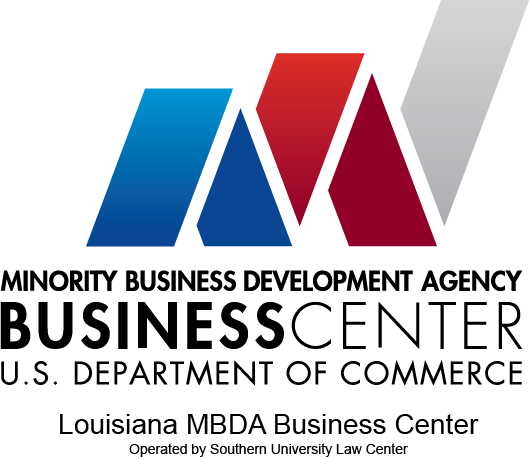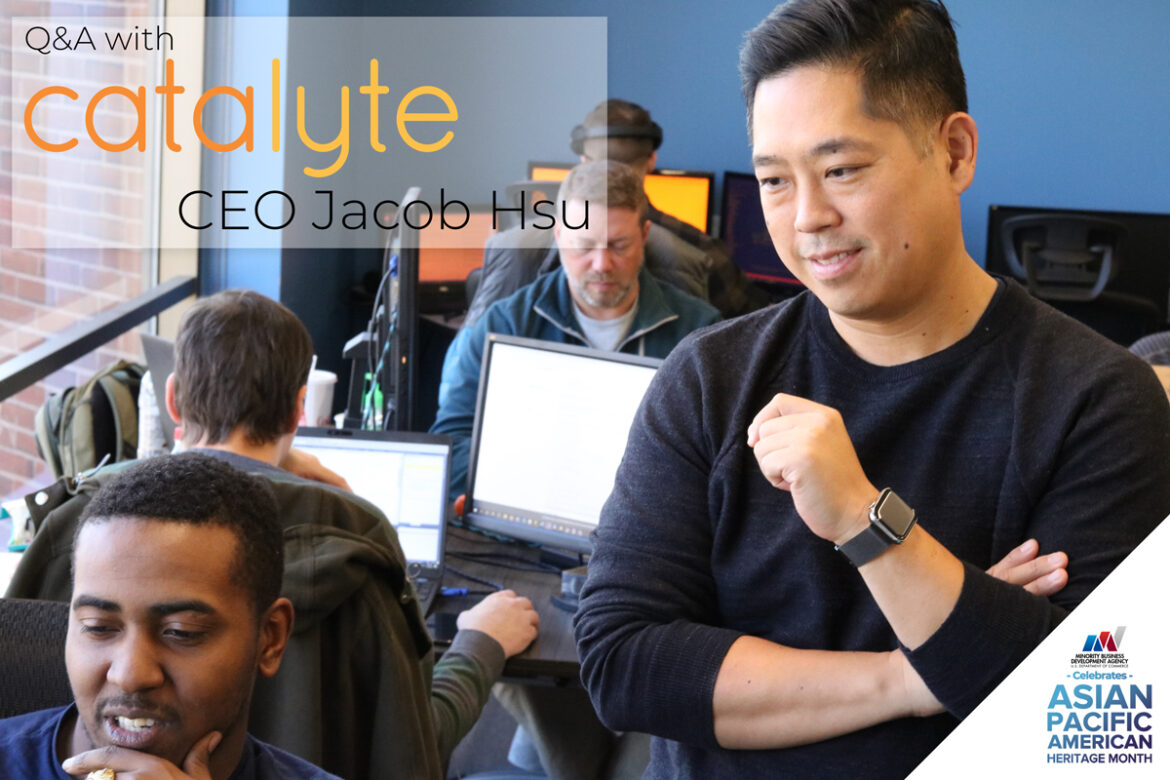Q&A with Catalyte CEO Jacob Hsu
DModeste@mbda.gov
Fri, 05/28/2021 – 09:59
Catalyte, headquartered in Baltimore, Maryland, leverages AI to identify, train and develop software engineering talent from unexpected places – by creating local, cost-effective, predictable, diverse and sustainable technology workforces to help companies meet their technology objectives today and into the future. CEO Jacob Hsu’s time leading Catalyte is dedicated to making this a reality and making the company a catalyst for a lifelong journey of personal, community and client improvement.
MBDA has been engaging with Catalyte’s CEO Jacob Hsu as a strategic partner and recently chatted about how to bridge connections for the MBDA National Network and the minority business community it serves.
MBDA: It appears that your Catalyte executive leadership team is very diverse; and research consistently shows that there is a substantial positive correlation between diverse leadership teams and financial performance. Do you have any advice for other small businesses on how to achieve this?
Jacob Hsu, CEO: Business owners need to understand that diversity isn’t something to cultivate just to feel good about yourself or your company. Diversity is important because it helps you build innovation and expand the problem-solving capacity of your organization. It creates stronger and wiser teams.
We know this from nature, where diverse bio systems are more resilient. What happens to a monoculture system when something changes? It collapses, as there’s no ability to change. Why do successful companies fail? Because they’ve downplayed diversity and optimized for a single outcome. Faced with disruption, they can’t pivot fast enough to survive. Clayton Christensen’s research around “The Innovator’s Dilemma” and why new disruptive technologies cause big firms to fail is really at its heart a treatise about the lack of diversity of thought in large corporations.
This is what diversity offers you: the ability to see problems ahead of time and have the different perspectives, ideas, insights and solutions to overcome disruptions and build a company that grows stronger overtime.
You have to actively seek this out in the people you surround yourself with and the people that you hire. It’s a mindset shift. Go back and look at Lincoln’s “Cabinet of Rivals.” While not “diverse” in our modern sense of the word, he was getting at the same idea. You need people who don’t look, think or act like you in the room when decisions are made. This ensures that you see as many possible disruptions ahead of time and have as many possible solutions to work from when they hit.
Let’s focus on the services you provide. Are you willing to share the good, the bad, and the ugly about competing for contracts in government and in private industry?
The good, the bad and the ugly all stem from the same thing: getting employers to stop using outdated and biased methods to evaluate and hire technology talent. There’s one story, which happened before I joined Catalyte, that sums this up.
We had just saved a major product launch, and I mean almost make-or-break the company sized launch, for a well-known F500 sports apparel company. They took our developers out to celebrate and asked what they did before joining Catalyte. One mentioned he had worked at Taco Bell. Another has a PhD in theoretical physics. A third trained dogs to chase geese off of golf courses.
This was not what the client expected to hear as the backgrounds of developers who just delivered this amazing product. It freaked them out and we didn’t hear from them for a few weeks. They weren’t ready to believe that amazing tech talent existed outside of the narrow niche they’d created in their minds.
The client did finally call us back and came around to be a true believer in our model. In fact, they went public with data a year or so later at a major tech conference confirming how our developers, former fast food workers or canine trainers, were better than traditionally sourced teams.
The world’s starting to come around to that mindset, but not fast enough. Being able to identify talent from across the broad spectrum of society will be key not just for us, but to help solve the systemic racial and economic issues the world faces.
How old were you when you KNEW you wanted to own and/or lead your own business? How much time passed until you began to make it happen?
There wasn’t one “Ah-ha!” moment for me. To be honest, I kind of fell into it by accident. If you’d asked me coming out of college what I wanted to do with my career, I would have said, “I want to be an investment banker.” That’s where I got my start and I really enjoyed that job. Don’t know what it says about me, but anything less than 14 hours doesn’t feel like a full day of work.
It wasn’t so much when I knew I wanted to lead my own business, but when I knew I could. After time in investment banking, I joined a small tech company (less than 40 people at the time) during the first dot-com era. I grew with the company by banging my head into the wall every day. That was the best learning experience possible. I love business and how business can solve problems. And as you grow from 40 people to over 23,000 people when I left as CEO…that’s a lot of problems to solve!
Let’s talk workforce development. Share a little about the process and decisions you have made to “find hidden technology talent”?
I could talk about how Catalyte uses 500 predictions models in our algorithm to screen for behaviors we’ve identified from 20 years of data on what makes a great software engineer. That’s all important, but you may not have read to the end of that sentence.
What we’re really doing is using technology and data to find people who have an extraordinary learning capacity, regardless of their backgrounds. We’re finding people who have the motivation and drive to change their lives.
This is really hard to do through traditional methods like resumes, which are what most of the world still uses. So, we’re fighting the dual battles of building the technology to solve the problem, and convincing the market that our way is the better way.
We’re now able to peel back the curtain and show the world what we’ve known for 20 years, that great developers can come from anywhere. With over 1000 people retrained, we have the outcome data that prove to clients that Catalyte produces better engineering talent. We can show them the outcome data and say, “See. This former school teacher is producing better code faster than your engineer with a CS degree.” This is really starting to hit home and we’ve converted clients into true believers in the process.
Has Catalyte taken any actions to address our country’s social injustice issues with staff? (George Floyd, Asian hate crimes, unfair treatment by law enforcement, voter suppression, etc.)
As an Asian American, I grew up with, and still face, people who see me as a “foreigner.”
My message to everyone at Catalyte is that you belong here and your voice matters.
Diversity isn’t the end. It’s a start. What matters is belonging and inclusion. You’re not an outsider. You’re not a foreigner. You’re one of us.
The way we find our engineers lends itself to this idea. We don’t care about where you went to school, what your previous job was, your pedigree or background. We care about what you’re capable of. If you can do it, you belong here. Period.
To reinforce those messages, we have held company-wide discussions about racial injustice and implemented bias training. We’re also active with numerous community partners to recruit new applicants to our free software developer training program from as broad a cross-section of the country as possible. It’s important that Catalyte is an active participant in solving our economic inequality crisis and providing meaningful opportunities to people who have historically been excluded from the technology industry. At Catalyte, they do belong.

